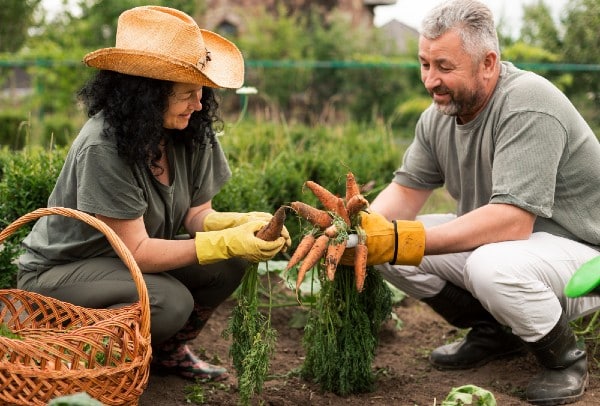Gardening, at any age, is a wonderful outdoor activity. It stimulates our senses as we connect with nature, and the result is a vibrant array of flowers, fresh fruits, and vegetables. For seniors with Alzheimer’s, gardening offers unique benefits. The scents of lavender and honeysuckle, along with the presence of pollinators, fill gardens with life. Even perennial herbs like mint and rosemary, which thrive outside of summer, can encourage seniors to engage with their surroundings by touching and tasting the leaves.
Sensory Gardens, specifically designed for individuals with dementia, are a testament to the therapeutic power of gardening. The use of color, touch, and scent in these gardens has a calming and grounding effect, often inspiring the recollection of distant memories and sensations.
Mental and Physical Benefits of Gardening
Gardening also has many mental and physical benefits for people with Alzheimer’s. Research indicates that engaging all the senses provides positive emotions that those with Alzheimer’s may no longer experience regularly.
Gardening is also an excellent way for aging bodies to get a moderate-intensity aerobic workout and stay flexible. You will get plenty of exercise preparing the soil, planting, watering, weeding, and then harvesting those flowers, veggies, and fruits. Gardening can use as many calories per hour as walking or water aerobics and provides stretching and muscle toning.
Long-Term Memory Loss
Sometimes loved ones with Alzheimer’s may become more paranoid and withdrawn as the disease progresses, and feel they may lose long-term memories. Gardening therapy may help our loved ones with cognitive function so they recall those pleasant long-term memories and bring them back to a healthier time.
Emotional Benefits
Gardening is not just about the physical act of planting and nurturing. It can provide an emotional boost , akin to the benefits of walking or dining out. Working in a community garden can lift the spirits of those who garden alone, offering a greater sense of contentment. The act of nurturing plants can be deeply fulfilling, leading to increased happiness and overall well-being.

Healthy Eating Habits
Growing fruits and veggies is an excellent motivation for our senior loved ones to consume more healthy, fresh food in place of processed foods. This commitment to a healthy diet plays a crucial role in maintaining brain health and potentially slowing cognitive decline in aging individuals, reducing the risk of Alzheimer’s and Dementia.
Benefits of Gardening on a Fixed Income
Seniors on a fixed income experiencing economic insecurity can supplement their food budget with what they grow. Growing even a small amount of fresh produce (like tomatoes, lettuce, or herbs) can reduce grocery bills. Beans, zucchini, and leafy greens are easy to grow and highly productive.
Many cities offer free or low-cost plots for seniors. Local senior centers, libraries, or agricultural extensions often provide free workshops to help beginners get started.
If you want to try gardening but are not sure where to start, consider trying fun gardening projects for seniors at Gardening for Seniors.

Having a Sense of Purpose
Gardening can give our loved ones a sense of purpose. Seniors sitting on their porches, receiving compliments on their flowers and plants from people passing by, gives them an incredible feeling of pride and improves their self-esteem. This sense of accomplishment can be a powerful motivator, making them feel empowered and capable.
All of the benefits above contribute to reducing the risk of Alzheimer’s by lowering the risk of health conditions that harm the brain, such as heart disease, high blood pressure, diabetes, and depression.
If you haven’t gardened in a while, or you’re new at it, this is a great time to give it a try. Even if you don’t have a yard, or it is past the growing season for plants in the ground, you can create a container garden or a few pots of herbs and move them indoors when the cold weather begins.
Promyse Caregivers can Help!
If your family uses in-home care services to support the well-being of a loved one, gardening can be a terrific activity for your loved one and the caregiver to do together. Your loved one can plan the garden, and the caregiver can pick up plants at the garden center.
The Promyse Home caregiver plays a crucial role in this process, helping create beautiful cut flower bouquets or delicious meals planned around fresh-harvested veggies, making them feel valued and integral.



